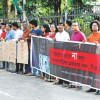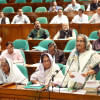Power determines stance
Ironically in our politics today, ideals, principles, beliefs or ethics do not determine what “stance” our leader will take. Rather, it is determined by power -- is the leader “in power” or “out of power” -- and that will determine the stance.
Here are some examples: While in opposition from 2001-2006, Sheikh Hasina was a vociferous critic of the extra-judicial killings by the law enforcers.
While addressing a public rally in Paltan Maidan in the city on January 10, 2005, she said, "Crossfire is a new pretext for killing people."
"We want to make it clear that everybody has the right to seek justice even if he is a criminal and what the government is doing now is nothing but gross violations of human rights."
Hasina had kept voicing concern against the menace.
Again on January 15 of the same year, Hasina accused the BNP-led government of letting loose “state terrorism” involving a special force which she said had killed by then 200 people without trial.
She was addressing a discussion of Bangladesh Chhatra League (BCL), the pro-Awami League student body, on the occasion of the organisation's 57th founding anniversary at Ramna Park in the city.
"We will not kill people by crossfire, we will improve law and order through justice and upholding human rights," she said, adding, "Today killing without trial takes place only to protect the godfathers of criminals."
On May 14, 2005, the AL chief also demanded a judicial enquiry into the extra-judicial killings.
Hasina on July 18, 2006 said the then ruling BNP-Jamaat alliance resorted to extra-judicial killings to cling on to power and to this end they even smeared the image of the Rapid Action Battalion.
"Though called an elite force, Rab is now involved in snatching and robbery behind the garb of 'crossfire”. They have created a record in mass killings ... this massacre must be stopped right now," she said.
BNP chief Khaleda Zia who is now vocal against extra-judicial killings was silent when the unlawful killings began 12 years ago. She was the prime minister when extra-judicial killing in the name of crossfire had been prevalent following the formation of Rab in 2004.
She did not denounce extra-judicial killings. Instead, she along with many of her party senior leaders tried to defend the unlawful killings by portraying the law enforcers' success in improving law and order.
For example: Khaleda Zia in January 2005 blasted the AL saying that a party does not want the anti-crime force as their “terrorists” cannot now unleash terrorism. She said Rab had been formed by enacting a law to curb crimes in the country -- one of the main election commitments of her party, the BNP.
But after she found herself out of power following the December 2008 parliamentary election, Khaleda has started emerging as a vociferous critic of extra-judicial killings.
Addressing a rally on September 26, 2011, Khaleda accused Rab of secret killings, and urged foreign countries not to train Rab and police for their human rights violation.
"I demand foreign nations refuse to provide training to Rab and this police," she said.
While addressing a public rally on November 12, 2014, she reiterated the accusation and demanded that the force be disbanded. "The Rab has turned into a killing force while police into a corrupt one."
Khaleda even called upon the United Nations not to hire Rab personnel for its missions abroad, saying they might carry out the same sort of activities there.
If necessary, Khaleda said, the BNP will send documents and reports about the repressive acts of the Rab and police to the international rights bodies.
Khaleda last Saturday said the government was “killing criminals in crossfire” to conceal its own involvement.
Addressing an Iftar party, Khaleda said some “criminals” were being captured even though it was not clear whether they were actually the real criminals. "They are put in crossfire because the information they reveal while under remand would implicate the government in these acts,” she said.
Her party BNP on Sunday at a press conference also demanded a judicial probe into all the recent extra-judicial killings in the form of crossfire.
Interestingly, her party does not say anything on such killings committed during its rule in between 2004-2006. In the last three years of the BNP rule, as many as 746 suspects were killed in crossfire by the law enforcement agencies, according to Ain O Salish Kendra.
The incident of crossfire declined to some extent during the caretaker government's two-year rule from 2007, with 256 killed through extra-judicial means.
AL PLEDGE
In the run up to the December 2008 parliamentary election, the AL had pledged to stop all types of extra-judicial killings. But things remained the same in the following years after the AL assumed office in January 2009.
In first four years of the AL-led government since 2009, as many as 338 suspects were killed in crossfire. Incidents of forced disappearances and secret killings were also on the rise.
The AL did not make any promise to stop extra-judicial killings in the run up to the January 5, 2014, elections. Until June 19 from 2014, a total of 323 people were killed through extra-judicial means, shows the records of Ain O Salish Kendra. And Hasina did not denounce extra-judicial killings the way she did 12 years ago.
The estimated extra-judicial killings of more than 1,700 people in last 12 years however reveal the bitter truth: the extra-judicial killings appear to have become the norm rather than the exception.
Over the years, this practice seems to have become a Frankenstein, destroying efficiency, professionalism and credibility of our law enforcement agencies.

 For all latest news, follow The Daily Star's Google News channel.
For all latest news, follow The Daily Star's Google News channel. 








Comments